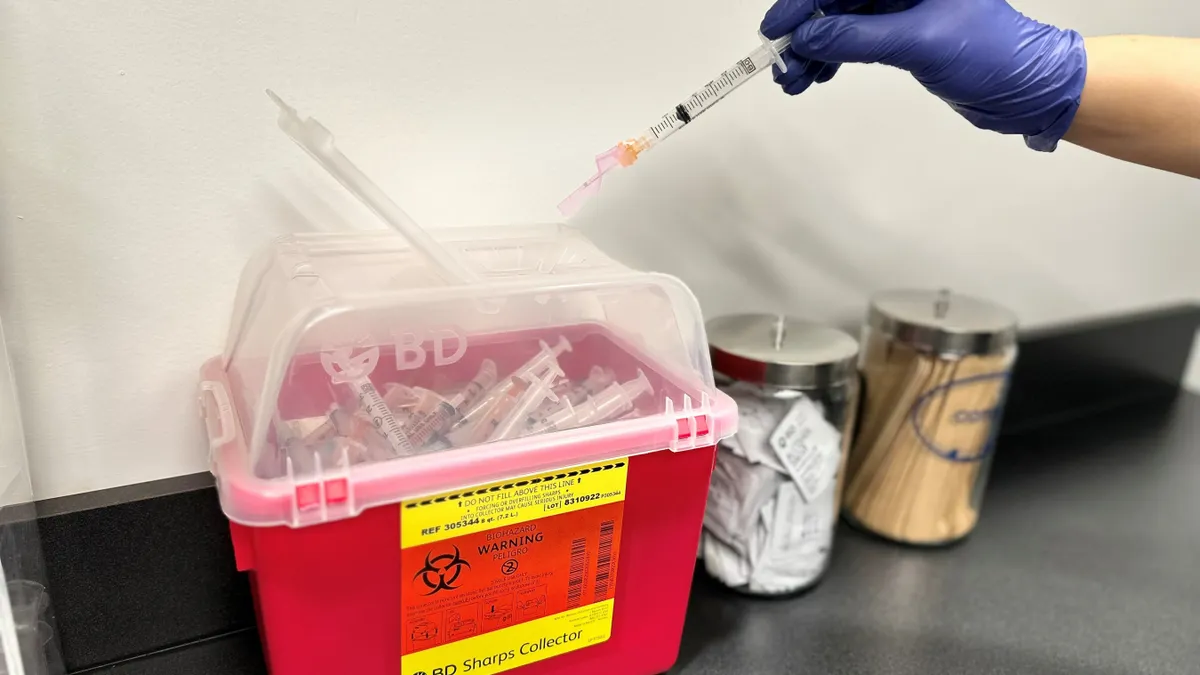Vaccines became widely available in the U.S. In some areas, lockdowns and masking ordinances were lifted, and schools were reopening. Many employers, too, had plans in place to reopen their doors to employees.
And yet, as has happened many times in the era of COVID-19, the winds are shifting.
Localized outbreaks have led to increases in cases, hospitalizations and deaths in states across the country, and those outbreaks have been fueled by the delta variant, according to the Centers for Disease Control and Prevention. The agency's website notes that the highest spread of cases and severe outcomes is happening in places with low vaccination rates, and even vaccinated individuals could experience "breakthrough cases."
That reality is causing employers to adapt, and the list of those reassessing their plans has grown in the past three weeks. Some, like retailer Target, are reinstituting mask requirements for workers and recommending that customers wear masks in areas with elevated transmission risk. Others, like Tyson Foods and Microsoft, are wading into an area that few had previously: issuing vaccination requirements for employees who show up to work in-person.
It has been challenging for employers to keep up with the current rate of developments, according to Lindsey Conrad Kennedy, member at law firm Eckert Seamans. "Many of us are dealing with COVID fatigue at this point," she said. "Employers have been frustrated in getting their businesses in compliance."
But regardless of which approach employers take and how they decide to enforce policies, Conrad Kennedy and other legal sources stressed the importance of consistency and transparency.
Return of the mask
Masks are just one part of the compliance equation. Many employers adopted the CDC's May guidance that stated fully vaccinated individuals could resume activities without needing to wear a mask, E. Pierce Blue, senior attorney at Morgan Lewis, said in an email.
As of July 27, however, CDC's interim guidance for fully vaccinated people includes a recommendation that fully vaccinated people wear a mask in public indoor settings in areas with substantial or high transmission, designations that presently cover a majority of counties in the U.S., according to agency data.
Employers will instead need to shift to monitoring of transmission rates by county and re-impose requirements where needed, or re-impose those requirements nationwide, Blue said.
Those who opt for the former should ensure updated policies are "clear and unambiguous and in writing," Brooke Schneider, senior associate at the firm Withersworldwide, said in an email. "This ensures that everyone has received the message, that the policy is being instituted uniformly and without improper considerations and allows employers to rely upon or point to the policy if they are getting resistance."
Employers can perform initial communication of such changes in a meeting or in-person while following up in writing, Schneider said. In the event of resistance from employees "it is important to reiterate that the employer has an obligation to protect the health and safety of all of its employees and that the employer is making decisions based on medical guidance and in the best interest of all its employees," she continued.
Conrad Kennedy similarly noted the importance of communicating policies clearly, early and often, while also ensuring that enforcement is consistent. "Inconsistent enforcement of policies, or no enforcement of policies, is a recipe for disaster for employers regardless of the situation," she said. Those in charge of enforcement, she added, must document violations and follow disciplinary procedures where appropriate.
The rise of vaccine requirements
The trend of vaccination mandates instituted by employers follows a few major developments, Blue said, including the May updated technical assistance issued by the Equal Employment Opportunity Commission. But recent court decisions have provided legal support, Blue added, including one ruling upholding a Texas hospital's mandate. In July, a federal judge also blocked a lawsuit challenging Indiana University's requirement that students be vaccinated before returning to campus in the fall, NPR reported.
"Many companies would still prefer to not require vaccination unless it's necessary to resume operations and keep their workforce healthy," Blue said. "That said, having some companies adopt mandatory vaccination policies makes it easier for others to take the same action."
Employers considering a mandate need to think about the factors impacting their specific workplaces, Schneider said.
For example, they may need to consider whether their workplaces are communal, and whether they permit employees to safely socially distance. They also may need to consider whether their workforce consists of those who are at a particular risk for contracting COVID-19 or experiencing serious symptoms, such as older workers or those with known health conditions.
Workers who are part of a union may be subject to an employment agreement or collective bargaining agreement that impacts the situation, Conrad Kennedy said.
"With regard to high-profile businesses, I do think that the actions of the large employers will influence the smaller businesses and give them greater comfort in enacting mandates of their own," Schneider said. "Some employers may, however, want to wait to see the impact of those mandates on the workforce of those big businesses before they do so themselves."
Can you fire unvaccinated employees?
Employers also should anticipate that a vaccine mandate will cause some resistance and plan for how they will approach those who refuse to be vaccinated, Schneider continued.
In situations where an employee refuses to comply with a mask mandate, Conrad Kennedy said termination could be a consideration; "If an employee is refusing to comply with what is essentially a safety protocol, then termination is viable."
But terminations that result from refusing to comply with a mandatory vaccination policy "may be a little more risky," she added, in part due to the sensitivity of the issue. EEOC's technical assistance notes that federal civil rights laws require employers to provide reasonable accommodations to employees who, because of a disability or a sincerely held religious belief, practice or observance, do not receive a COVID-19 vaccination. If employers encounter resistance to a mandate, they should first have a discussion to determine the employee's reasoning, Schneider said.
In situations where an employee has a reason for not complying with a vaccination requirement that is separate from those outlined by EEOC, Conrad Kennedy said termination "may be on the table," as with other cases in which employees do not comply with an organization's policies. However, she noted that "it may be smart for employers to look at alternatives, because legal uncertainty remains."
Both Conrad Kennedy and Schneider noted that terminations could create staffing concerns. Schneider said that, even if firing is on the table with respect to an employee refusing to get vaccinated, employers need to ensure they have the necessary bandwidth and personnel.
"There are a significant number of employees who may refuse to get vaccinated but who don't have a medical or religious reason for refusal," Conrad Kennedy said. "Are you really going to terminate them? Are you going to allow disruptions to business operations?"
On the other hand, vaccination requirements could help retain employees who have concerns about re-entering the workplace with people who are not vaccinated, she noted. Additionally, employers may consider alternatives to termination, such as placing employees on leave; "that's a sort of discipline, but that's what I've seen employers do," Conrad Kennedy said.
But similar to mask requirements, employers will need to be consistent when it comes to vaccination policies, Schneider said, adding that "consistency of enforcement is imperative to establishing the legitimate nature of the policy, as well as the legitimate decision for the disciplinary action."





















